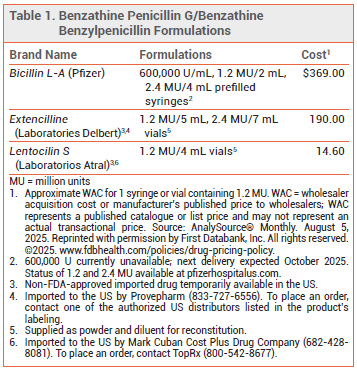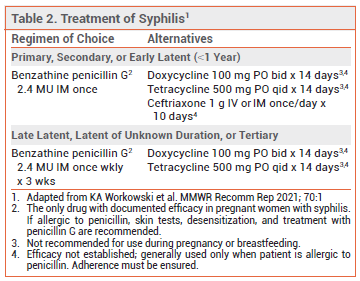RELEASE
ARTICLE
On July 10, 2025 Pfizer issued a voluntary recall of certain lots of long-acting intramuscular (IM) benzathine penicillin G (Bicillin L-A) due to particulates identified during visual inspection.1 The CDC has issued a "Dear Colleague Letter" to alert healthcare providers about the recall and provide advice on how to manage the potentially limited supply of the drug for treatment of syphilis, which has been increasing in the US.2 Benzathine penicillin G is also used for treatment of group A streptococcal pharyngitis and prophylaxis of rheumatic fever.
In response to a previous shortage of Bicillin L-A in 2023, the FDA approved temporary importation of two equivalent IM penicillin formulations, Extencilline (benzathine benzylpenicillin) and Lentocilin S (benzathine benzylpenicillin tetrahydrate), both of which remain available (see Table 1).
SYPHILIS — IM benzathine penicillin G is the drug of choice for treatment of primary, secondary, or early latent syphilis (less than one year's duration) and for late latent (>1 year's duration), latent of unknown duration, or tertiary syphilis (gumma or cardiovascular).3 Oral doxycycline is usually recommended as an alternative when benzathine penicillin G cannot be given. Tetracycline is another alternative, but it causes more gastrointestinal adverse effects and requires more frequent dosing. Ceftriaxone appears to be effective for primary and secondary syphilis, but data are limited (see Table 2).4
Because parenteral penicillin G is the only drug with documented efficacy for treatment of syphilis during pregnancy, the CDC recommends considering use of doxycycline to treat syphilis in non-pregnant women and men during the supply shortage.2 Pregnant women with syphilis who are allergic to penicillin should be desensitized and treated with penicillin G.4
ANTISTREPTOCOCCAL PROPHYLAXIS — Long-term antimicrobial prophylaxis is recommended for prevention of recurrent episodes of streptococcal pharyngitis and acute rheumatic fever, which can worsen the severity of rheumatic heart disease. IM benzathine penicillin G once every 28 days is the drug of choice for prophylaxis. Twice daily administration of oral penicillin V is an alternative that is commonly used in nonendemic areas such as the US, but the risk of recurrence is higher with oral prophylaxis.5 Oral azithromycin or sulfadiazine can be used in patients with a confirmed allergy to penicillin.
- Pfizer. Urgent: drug recall. Bicillin L-A. July 10, 2025. Available at: https://bit.ly/46Jt8od. Accessed August 28, 2025.
- CDC. Bicillin L-A. Priority actions following recall. July 18, 2025. Available at: https://bit.ly/45taFdq. Accessed August 28, 2025.
- Drugs for sexually transmitted infections. Med Lett Drugs Ther 2022; 64:97.
- KA Workowski et al. Sexually transmitted infections treatment guidelines, 2021. MMWR Recomm Rep 2021; 70:1. doi:10.15585/mmwr.rr7004a1
- MA Gerber et al. Prevention of rheumatic fever and diagnosis and treatment of acute streptococcal pharyngitis: a scientific statement from the American Heart Association Rheumatic Fever, Endocarditis, and Kawasaki Disease Committee of the Council on Cardiovascular Disease in the Young, the Interdisciplinary Council on Functional Genomics and Translational Biology, and the Interdisciplinary Council on Quality of Care and Outcomes Research: endorsed by the American Academy of Pediatrics. Circulation 2009; 119:1541. doi:10.1161/circulationaha.109.191959


